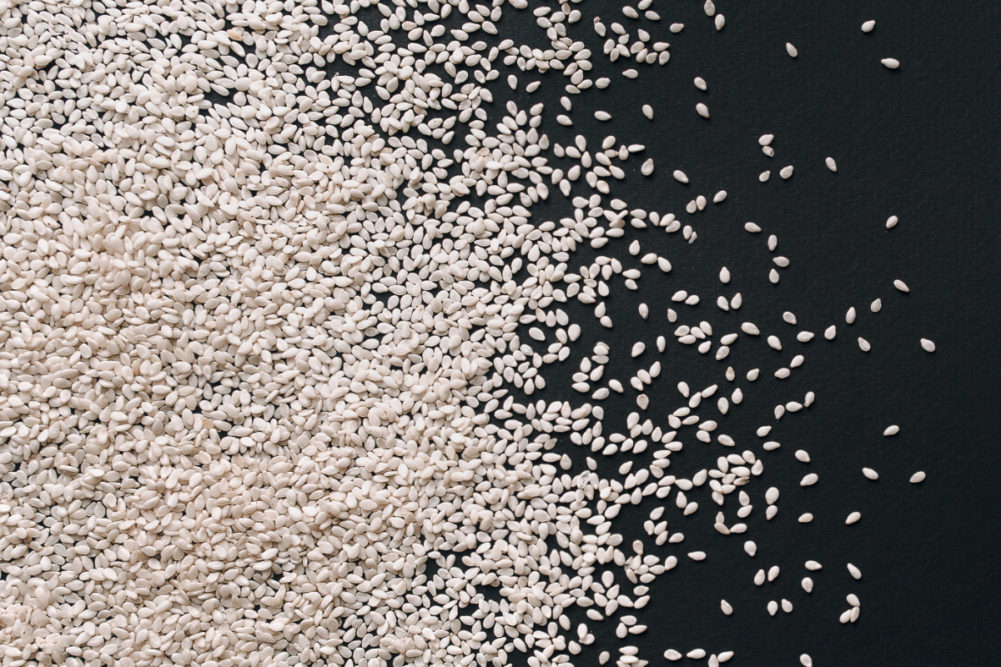 Legislation signed into law April 23 by President Biden declaring sesame a major allergen is of greater consequence to baking than any other segment of the food industry. Having passed both houses of Congress by wide margins, the Food Allergy Safety, Treatment, Education and Research Act of 2021 will require food companies to declare the presence of sesame on food packaging labels no later than Jan. 1, 2023.
Legislation signed into law April 23 by President Biden declaring sesame a major allergen is of greater consequence to baking than any other segment of the food industry. Having passed both houses of Congress by wide margins, the Food Allergy Safety, Treatment, Education and Research Act of 2021 will require food companies to declare the presence of sesame on food packaging labels no later than Jan. 1, 2023.
The first food added to the list of major allergens in more than a decade, sesame stands apart in a key regard from the other eight allergens — dairy, wheat, eggs, peanuts, tree nuts, soy, fish and shellfish. Consumption of sesame in the United States pales when measured against the eight other major food allergens. US consumption of sesame each year has been estimated at about 40,000 tonnes. That compares to 6.8 billion tonnes of eggs (113 billion eggs), 101 million tonnes of milk and 1.14 million tonnes of peanuts.
While not a major caloric source in the diet, sesame prompts an allergic reaction in 700,000 Americans, according to Food Allergy Research and Education (FARE), an allergen awareness advocacy group. It is the ninth most common food allergen, according to FARE. Those closely attuned to food allergen issues had been expecting the naming of sesame as a major allergen. Sesame has been categorized as a major allergen in Canada for nearly 10 years, and sesame also is among the European Union’s list of major food allergens.
Sesame is widely used as a baking ingredient and topping, and bakers will have their work cut out for them ahead of the 2023 compliance date. The stakes are high. Food allergens are the top trigger of food recalls, year after year. Unlike pathogens, there is no kill step in baking to eliminate allergens. Over the next 18 months bakers will have to transition labeling to declare products that contain sesame, and some bakers are likely to print on certain labels that the products are made in a plant that uses sesame.
At the same time, there is good reason to believe the baking industry is well prepared to deal with the addition of sesame to the list of major allergens. Carefully handling allergens already is a core competency of the US commercial baking industry. It wasn’t always so. Before the first allergen regulations were instituted, many baking companies had no allergen control programs.
But that was 15 years ago, when the 2006 Food Allergen Labeling and Consumer Protection Act became law. Today, baking plants commonly have four, five or six food allergens in their plants and bakers have become adept at handling and tracking. The 2011 Food Safety Modernization Act (FSMA) only heightened the attention paid to allergen control. Many bakers regularly test for allergens and have been treating sesame as a sensitive ingredient for years. More than a few are shipping sesame-containing products to Canada, where, again, sesame already is a major allergen.
In other ways, the transition is expected to be onerous. In addition to the handling care necessary for sesame and labeling changes, bakers also will need to communicate with ingredient suppliers who may be adding sesame to various mixes. Additionally, it is likely some baking plants will adjust production schedules to adapt to the new sesame law. A plant that makes both plain and sesame buns may opt to run sesame products last, just ahead of when the plant goes through cleaning and sanitation.
Also making this regulatory change a heavy lift is the compound effect of so many other rules currently taking or about to take effect. Beyond the existing allergen law and FSMA, bakers and other food processing companies already are working on meeting the terms of the National Bioengineered Food Disclosure Law, which goes into effect Jan. 1, 2022. Some bakers only now are completing changes mandated to the Nutrition Facts panel label.
That many industry observers are confident bakers will implement the new allergen law without a hitch speaks volumes about the proficiency bakers have achieved when it comes to ensuring their products are delicious, nutritious and safe.






